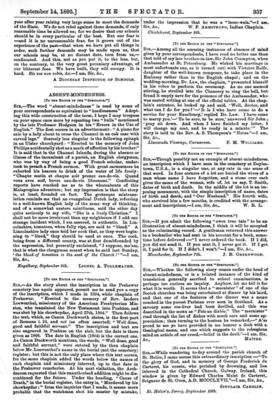ABSENT-MINDEDNESS. [To THE EDITOR OF THE " SPECTATOR. " ] SIR,—The word
" absent-mindedness " is used by some of your correspondents as equivalent to "heedlessness." Adopt- ing this wide construction of the term, I hope I may trespass on your space once more by repeating two " bulls" mentioned by the late Professor Hodgson in his " Errors in the Use of English." The first occurs in an advertisement : " A piano for sale by a lady about to cross the Channel in an oak case with carved legs." Scarcely less singular is the following epitaph in an Ulster churchyard : " Erected to the memory of John Phillips accidentally shot as a mark of affection by his brother:" It is said that in the Channel Islands, during the absence or illness of the incumbent of a parish, an English clergyman, who was by way of being a good French scholar, under- took to preach a French sermon, With great earnestness he exhorted his hearers to drink of the water of life freely : " Chaque matin et chaque soir prenez eau-de-vie. Quand vows avez soil, bnvez eau-de-vie librement." Conflicting reports have reached me as to the whereabouts of this Malapropian adventure; but my impression is that the story is, at least, founded on fact. The grotesque mistrans- lation reminds me that an evangelical Dutch lady, referring to a well-known English lady of the same way of thinking, and of a somewhat austere saintliness, said the other day quite seriously to my wife, " She is a lively Christian." I shall not be more irrelevant than my neighbours if I add one strange incident which, I am assured, is authentic. In Lin- colnshire, tomatoes, when fully ripe, are said to "bleed." A Lincolnshire lady once told her cook that, as they were begin- ning to " bleed," they should be used at once. The cook, being from a different county, was at first dumbfounded by the expression, but presently exclaimed, "I suppose, ma'am, that is what the clergyman meant when he said last Sunday,


































 Previous page
Previous page